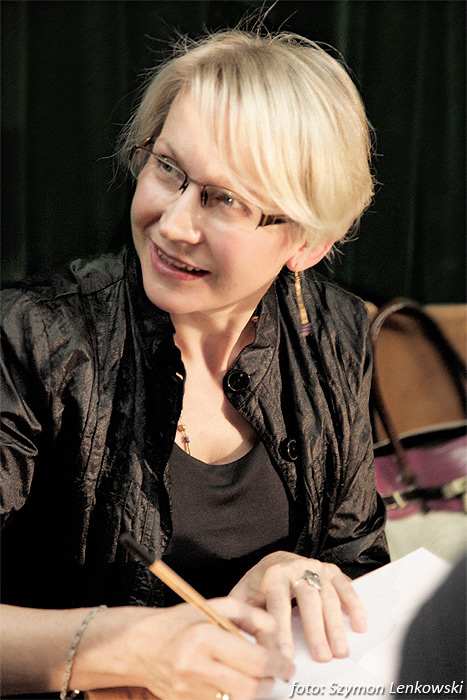An Interview with Poet Krystyna Lenkowska http://prishtinapress.info/an-interview-with-poet-krystyna-lenkowska/ Exclusive Interview with poet Krystyna Lenkowska Interview by: Bujar Plloshtani
Krystyna Lenkowska What do you think about poetry, and what motifs do you use in your poems?Krystyna Lenkowska: Poetry, alongside prose, music and art, is my life companion. Writing poetry for me is calling for attention, empathy. The quieter it sounds, the more desperate it may be inside. A poet is someone who desperately wants to have access to the truth by means of partisan strategies (very different from the regular armies of scholars!). My motifs? Let me think: a rose, white colour, light, a window, music, love, death, loneliness, time, beauty, and their antinomies. You are a translator of English-language literature. Who are the authors that you have chosen to translate into Polish?Krystyna Lenkowska: At the moment I am translating Emily Dickinson, who could be a good example of what I have just said about quiet, almost silent, ascetic surface and strong, deep, piercing inner voice of the poet. Emily Dickinson is considered to be one of the most original 19th century American poets, admired for her slanted rhymes, unconventional meter and innovative style. The poet, a heartbroken introvert with a unique, keen and sharp, insightful vision of the human condition, has inspired poets of all languages for about two centuries now. I realize that this translation work is a great challenge and, besides the translator’s talent it requires a lot of time and extra attention. In the past, I also translated and published in Polish literary magazines two Canadian poets, Michael Ondaatje and Anne Carson. Being a conscious translator myself (from English into Polish, not à rebours), I do not translate my own poems. I am lucky to have a splendid translator into English, Ewa Hryniewicz-Yarbrough, who lives in Boston, USA. How much impact has poetry and translation on each other? Krystyna Lenkowska: “Lost in translation” is now an overused phrase, but it’s still very true. There is always something lost in translation. A good translator realizes the loss and knows how to compensate for it, preserving the idiosyncratic style of the poet. That is why “found in translation” is another thought accompanying translators’ work. What works have influenced the fame and maturity of your poetic presentations? Krystyna Lenkowska: The word “fame” is too vague here. What works influenced my own poetry and perhaps affected the crystallization of my individual style? Apart from a few philosophers, and my favourite prose writers like Bohumil Hrabal and Gabriel Garcia Marquez, I was influenced by some Polish poets: Tadeusz Różewicz, Wisława Szymborska, Bolesław Leśmian, Miron Białoszewski. Also, a few French symbolic poets such as Apollinaire, Rimbaud, and Baudelaire contributed to my poetic maturity. And I was significantly affected by the poets from the English speaking countries, W. B. Yeats, T.S. Eliot, Sylvia Plath, as well as the Russian poets like Achmatowa, Yesienin, Tsvetayeva. What do you think about Polish literature in the context of European literature? Krystyna Lenkowska: Talking of the Polish literature abroad, I can hear a repeated question: what water of which rivers do you drink to breed such great poetry? Two Polish Nobel prizes in poetry in such a short time speak for themselves. Polish literature is not very strong now in prose, although in the past, we had great prose writers, for example Prus, Reymont, Sienkiewicz. It is true however, that Poland is famous for its poetry. Our romanticism can be compared to the English Romantic Movement, but for historical reasons it was more patriotic. Mickiewicz, Słowacki and Norwid, who as a result were emigrant poets, are the most significant representatives of our romanticism. Since then, many Polish poets have had this romantic and patriotic stamp. Among the contemporary poets we have solid names like Zbigniew Herbert, Tadeusz Różewicz, Czesław Miłosz, Wisława Szymborska. I’m sure, some of them, if not all, have been the devoted readers of Bolesław Leśmian, our genius poet who lived in the modernist period, but eludes classification. Many younger Polish poets, who have been immensely influenced by some American poets like Frank O’Hara or Beat Generation poets, represent the fragmented and post-modernist style of writing. My own place is closer to the classical poetry. Although the publication of my first book coincided with the “Barbarian” anthology, generationally, philosophically, and aesthetically I’m closer to the poets born after the end of the Second World War. What can we as readers expect in the near future from Krystyna Lenkowska and what are Krystyna Lenkowska’s ambitions and plans? Krystyna Lenkowska: Writing poetry is not a race or a competition. It’s neither a regular job with agenda, a career, which is focused on tasks and effects. I don’t know. I don’t even know if I am a poet. Czesław Miłosz said: “poetry should be written rarely and not eagerly”. It is very sophisticated advice for every poet. If you are a real writer, do not make too many plans, hide your ambitions, don’t raise your expectations, just write. The careful readers will help you to overcome your “reluctance”, and their hope will become your sense and plan. That’s how I read Miłosz’s humorous and bitter message for poets. What is your opinion on the role of media in literature? Krystyna Lenkowska: Media can make good writers or good books come out of the shadows. But they also have the power to do the same with bad literature. They can promote junk or send a good book to limbo if the lobby of devils is stronger than the lobby of angels. |